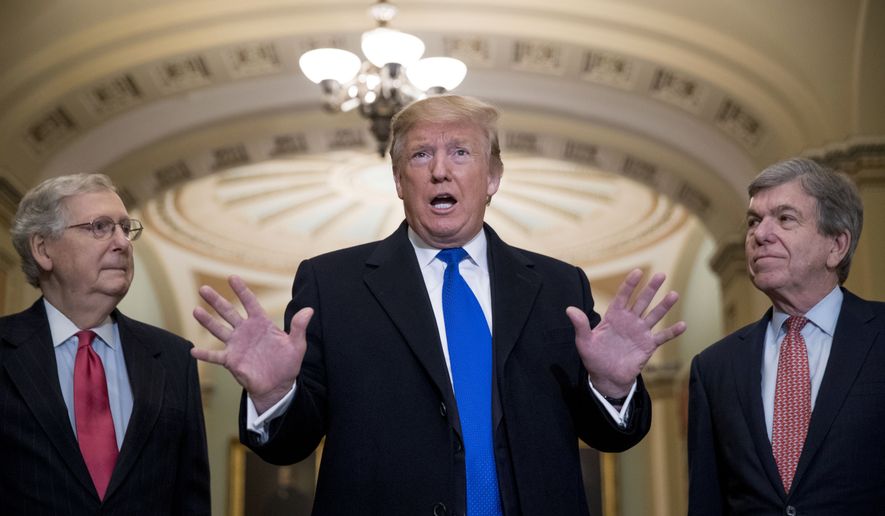House lawmakers failed Tuesday in their bid to overturn President Trump’s first veto, effectively upholding his declaration of a border emergency and leaving him with a free hand to build more of his border wall.
Democrats cast the vote as a test of patriotism, saying Congress needed to stand up to a tyrannical president overstepping his emergency powers.
But they didn’t come close to winning enough Republicans to garner the two-thirds majority needed to override a presidential veto. The 248-181 vote fell far short as Republicans brushed aside Democrats’ rhetorical challenge and said the border situation was every bit the crisis that Mr. Trump described.
“Border security used to be a bipartisan issue,” said Rep. Mike Rogers of Alabama, the ranking Republican on the House Homeland Security Committee. “The president’s declaration is only necessary because Congress can’t reach a deal to secure our country.”
Democrats said they will renew the fight in a few months, when the next round of spending bills is due.
“The president’s lawless emergency declaration clearly violates the Congress’ exclusive power of the purse, and Congress will work through the appropriations and defense authorization processes to terminate this dangerous action and restore our constitutional system of balance of powers,” House Speaker Nancy Pelosi, California Democrat, said in a joint statement with Rep. Joaquin Castro of Texas, chairman of the Congressional Hispanic Caucus.
That could precipitate another shutdown showdown come September.
For now, though, attention will shift from Capitol Hill to the courts, where lawsuits have been filed from coast to coast in attempts to block Mr. Trump’s wall plans.
The fight is over billions of dollars that Mr. Trump is trying to move from the Pentagon’s accounts in order to build a wall along the southern border.
After battling Congress for a year and forcing a monthlong partial government shutdown, Mr. Trump received $1.375 billion for the wall in last month’s spending bill, well short of the more than $5 billion he sought.
The president signed that legislation but immediately announced that he would use other money too: $601 million in a Treasury Department forfeiture fund, $2.5 billion from a Pentagon drug interdiction account and up to $3.6 billion in military construction money.
The emergency declaration applies to the construction money.
Mr. Trump justified the moves by pointing to the latest numbers, which showed surging drug shipments and more illegal border crossings than at any other point in years. Worse yet, he said, the migrants are children and families who are nearly impossible to deport once they gain a foothold in the U.S.
“Democrats continue to ignore the reality that our porous southern border is a magnet for illegal immigration, child smugglers, human traffickers, drug cartels, gangs and many other criminals,” said Hogan Gidley, a White House spokesman. “Today’s vote reaffirms Democrats are the party of open borders, drugs and crime.”
Democrats counter that a wall won’t stop the hard drugs, most of which are transported in vehicles going through legal border crossings, and that it will take more than a wall to stop the children and families from Central America, who have discovered legal loopholes that they can exploit to remain in the U.S.
Yet Democrats said even more was at stake: the power to control the purse, explicitly granted to Congress in the Constitution.
“We take an oath to the Constitution, not to the president of the United States,” Mrs. Pelosi said. “The choice is simple: between partisanship or patriotism.”
Republicans said they might have been more amenable to those arguments if Democrats didn’t look the other way in 2012 and 2014, when President Obama claimed powers to grant legal status to millions of illegal immigrants after Congress failed to pass the legislation he wanted.
Republican lawmakers also wondered when Democrats soured on border walls, after many of them voted to fund walls under President George W. Bush and Mr. Obama.
In the end Tuesday, just 14 Republicans sided with Democrats to try to overturn the veto — about the same number as voted last month during the initial vote to end the wall declaration.
Democrats hoped to peel away more Republicans in the intervening weeks by pointing to a list of projects that could be delayed with the shift in money, but that list remains speculative, and House Republicans remained rigidly linked to Mr. Trump.
Mr. Trump was flexing powers under the 1976 National Emergencies Act, which gives a president the ability to order immediate military construction in the event of a crisis.
That law also gave Congress the power to thwart the president if it could muster the votes. Both the House and Senate did vote to stop the emergency, but the president vetoed the bills.
Acting Defense Secretary Patrick M. Shanahan notified Congress on Monday night that it was shifting $1 billion from military readiness funding to the drug interdiction account, where it could be used for building the wall.
House Armed Services Committee Chairman Adam Smith, Washington Democrat, tried to block that move Tuesday by sending a letter denying what he called the Pentagon’s “request.”
“The committee does not approve the proposed use of Department of Defense funds to construct additional physical barriers,” he wrote.
The administration argues that it doesn’t need congressional approval to move money into the drug interdiction account. That also will likely be the subject of a legal challenge.
But Mr. Smith suggested broader implications. He said Congress, which traditionally has given the administration power to move some money, will no longer allow that flexibility in bills.
⦁ Bailey Vogt and Lauren Meier contributed to this report.
• Stephen Dinan can be reached at sdinan@washingtontimes.com.




Please read our comment policy before commenting.